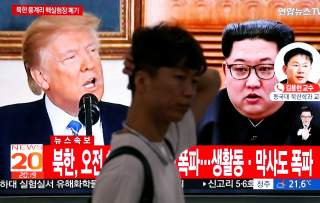The Hanoi Summit – We Asked Erica Fein What Happens Next in U.S.-North Korea Relations
"The key factor is who Trump listens to more: Bolton or Moon."
Editor’s Note: Looking for more opinions on where we go after the Hanoi summit? Check out all 80 expert takes on where U.S-North Korea relations go next here.
Following the failed Hanoi Summit between President Donald Trump and North Korean Chairman Kim Jong-un, there is reason to be nervous about prospects for continued diplomacy. Much will be determined by how much Trump empowers his cunning and hawkish national security advisor, John Bolton. Bolton has already notched two major diplomatic kills on his belt since joining Trump’s administration: the Joint Comprehensive Plan of Action and the Intermediate-Range Nuclear Forces Treaty. Over Bolton’s career, he has had many more, including ending the Anti-Ballistic Missile Defense Treaty, pushing for the 2003 invasion of Iraq, and—most importantly here—the demise of the 1994 Agreed Framework between the United States and North Korea. We should not be surprised if Bolton is gunning for this current round of U.S.-DPRK diplomacy as well.
Indeed, during the Hanoi Summit and in the days since, there have been signs that Bolton has the President’s ear and has boxed out engagement proponent U.S. special envoy Steve Biegun. It appears now that that the United States is taking Bolton’s preferred maximalist approach to North Korean denuclearization; that is, the unilateral dismantlement of North Korea’s entire arsenal of weapons of mass destruction program—nuclear, chemical, and biological—in exchange for subsequent sanctions relief. Should North Korea believe that it cannot trust the United States to negotiate in good faith, it may quickly turn away from further talks and from the commitments it has already made regarding its nuclear program.
A less predictable factor is how much South Korea’s President Moon Jae-in can persuade both Trump and Kim that maintaining the current diplomatic course is in their interest. President Moon campaigned and then staked his presidency on peace and reconciliation on the Peninsula. Not only has he achieved important inter-Korean deescalation and economic cooperation measures, but he has also during times of uncertainty skilfully persuaded Trump to continue talks with Kim. After the failure of Hanoi, he immediately called for a return to negotiations.
At this point, our best hope, perhaps, is that the sides muddle through by maintaining working-level negotiations that create smaller steps of progress, even if they fall short of a grand deal. That would mean that Bolton, who in 2018 made the case for war with North Korea, does not get his way. It likely means Moon will have won the influence game with Trump. It would also pave the way for a new U.S. president in 2021, should one be elected, to take on this vexing security challenge without starting from square one on diplomacy.
Erica Fein is the Advocacy Director at Win Without War.
Image: Reuters

